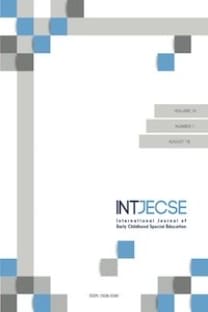Özel desteğe gereksinimi olan çocukların eğitim desteği hakkından öğretmenlerin görüşleri
Teachers' view of educational support to children in need of special support
Children in need of special support, preschool education, educational support, preschool teacher,
___
Alexandersson, M. (1994). Den fenomenografiska forskningsansatsens fokus. In B. Starrin & P G. Svensson (Eds.), Kvalitativ metod och vetenskapsteori. [Qualitative method and research theory] (pp.128-131). Lund, Sweden: Student- litteratur.Beckman, P.J., Hanson, M.J., & Horn, E. (2002) Family Perceptions of Inclusion. In S.L. Odom (Ed.), Widening the Circle. Including Children with Disabilities in Preschool Programs (pp. 98-108). New York: Teachers College Press.
Briggs-Gowan, M., J., Carter, A., Moye Skuban, E., & McCue Horwitz, S. (2001). Prevalence of social-emotional and behavioural problems in a community sample of 1- and 2-year- old children. American Academy of Child and Adolescent Psychiatry, 40, 811-819.
Canning, P., & Lyon, M (1989). Young children with special needs: Prevalence and implications in Nova Scotia. Canadian Journal of Education, 14, 368-380.
European Agency for Development in Special Needs Education (2006). Early Childhood Intervention Recommendations. Summary Report. of Situations in Europe Key Aspects and
Ladd, G., & Kochenderfer-Ladd, B. (2002). Identifying victims of peer-aggression from early childhood: Analysis of cross-informant data for concordance, estimation of relational adjustment, prevalence of victimization, and characteristics of identified victims. Psychological Assessment, 14, 74-96.
Lillvist, A., & Granlund, M. (2009). Preschool children in need of special support: prevalence of traditional disability categories and functional difficulties. Acta Pædiatrica. DOI:10.1111/j.1651-2227.2009.01494.x
Lillvist, A., Sandberg, A., Björck-Åkesson, E., & Granlund, M. (2009). The construct of social competence-How preschool teachers define social competence in young children. International Journal of Early Childhood, 41 (1), 51-68.
Marton, F. (1994). „Phenomenography’. In T. Husén & T. N. Posthlewaite (Eds.), The International Encyclopedia of Education (2nd ed), (Vol. 8, pp.4424– 4429). Oxford: Pergamon Press.
Marton, F., & Booth, S. (2000). Om lärande [About learning]. Lund, Sweden: Studentlitteratur.
National Agency for Education (2004). Förskola i brytningstid – en nationell utvärdering av förskolan [Preschools in change – A National evaluation of preschools in Sweden]. Stockholm, Sweden: Fritzez.
National Agency for Education (2006). Curriculum for the preschool, Lpfö 98 Stockholm, Sweden: Fritzez.
Nutbrown, C., & Clough, P. (2004). Inclusion and exclusion in the early years: conversations with European educators. European Journal of Special Needs Education, 19 (3), 301-315.
Pedhazur, E-J., & Pedhazur-Schmelkin, L. (1991). Measurement, Design and Analysis: An Integrated Approach. Hillsdale, NJ: Lawrence Erlbaum Associates, Inc.
Sandberg, A., Anstett, S., & Wahlgren, U (2007). The Value of In-service Education for Quality in Pre-school. Journal of In-Service Education, 33 (3), 301-319.
Sandberg, A., Lillvist, A., Eriksson, L., Björck-Åkesson, E., & Granlund, M. (accepted) Children in need of special support in preschool in Sweden – how is the construct defined and applied? International Journal of Disability, Development and Education.
Swedish Research Council (2002) ETIK. Forskningsetiska principer för humaniora och samhällsvetenskap. [ETHICS. Research ethics principles for humanities and social science].
Taggart, B., Sammons, P., Smees, R., Sylva, K., Melhuish, E., Sirja- Blatchford, Elliot, K., & Lunt, I. (2006). Early identification of special educational needs and the definition of ”at risk”: The early years Transition and special educational needs (EYTSEN) project. British Journal of Special Education, 1, 40-45.
- ISSN: 1308-5581
- Başlangıç: 2009
- Yayıncı: İbrahim H. DİKEN
Down sendromlu bireyler konusunda konuşma dili: Yaşam boyu bakış açısı
Özel desteğe gereksinimi olan çocukların eğitim desteği hakkından öğretmenlerin görüşleri
Anette SANDBERG, Martina NORLİNG, Editörden, Anne LİLLVİST
Avusturya'da erken çocukluk müdahalesi: 30 yıllık gelişime genel bir bakış ve gelecekteki zorluklar
Erken çocukluk özel eğitimi için program yöneticisi rehberi
Otizmli iki çocukla yoğun gündüz tuvalet eğitimi: Sistematik uygulama ve izleme başarıyı garantiler!
Gönül Kırcaali-İftar, Burcu ÜLKE-KÜRKÇÜOĞLU, Özlem Çetin, Editörden, Emre Ünlü
Otizm spektrum bozuklukları olan küçük çocuklar için kapsayıcı bir program planlama
Brenda Smith Myles, Barry G. Grossman, Ruth Aspy, Shawn A. Henry
